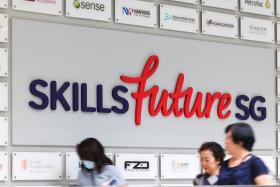Need to do more to close social divide, says Minister Ong Ye Kung
Education Minister: Social stratification must be tackled before it is entrenched
In her inaugural address at the re-opening of Parliament last week, President Halimah Yacob stressed inequality as an issue that had to be tackled vigorously.
Education Minister Ong Ye Kung yesterday warned that social stratification had to be tackled to ensure it does not become entrenched here.
While Singapore has policies in place to bridge the gap between those from higher- and lower-income groups, Mr Ong said more has to be done, emphasising educational policies and lifelong learning and improvement through SkillsFuture.
MODERATE INCOME GAP
Singapore's ratio of incomes at the 90th to the 10th percentile is quite high, at 5.8.
Despite this, Mr Ong said Singapore's policies, such as progressive taxation, help moderate income disparity. Schemes like GST vouchers and subsidies in areas like education also help lower-income groups.
He added: "What is equally important is that high-income earners also give back to society through philanthropy. With the muscle of progressive taxation and redistribution and the spirit of giving back, we can moderate the effects of an income gap."
HELP MIDDLE-INCOME GROUP
Mr Ong said that with inclusive growth, Singapore has a strong middle-income core. But this middle-income group is also finding it hard to do better.
"The challenge ahead is that many middle-income families hope to do better, and for their children to be better off than them. But given the high base we are at, the climb is getting harder," Mr Ong said. "We will still improve, but mostly likely it will be in steps and not leaps."
IMPROVE SOCIAL MOBILITY
Mr Ong said one of Singapore's biggest achievements is families being able to transform their lives over a generation. Fourteen per cent of those with parents who were in the lowest income quintile when they were growing up managed to move up to the top quintile.
But while well-to-do families pass on their privileges to their children, who have a head start, lower-income families find it hard to improve their lot.
He said: "For families who can't move up... we find their circumstances more dire and challenging than poor families of the past. Social stratification is starting to become entrenched."
IMPROVE THE SOCIAL MIX
Public policies help Singaporeans mix with each other.
Mr Ong said: "Every precinct or community is planned with a range of housing types, so that every estate has a good mix of Singaporeans from different backgrounds."
He said more than 80 per cent of schools have a relatively balanced mix of students from top and bottom socio-economic quintiles. However, "some schools, due to their history, culture or programme offerings, have large proportions of students from higher-income groups".
"When groups are predominantly formed along socio-economic status... it is the start of stratification and that will poison our society over time. Our policies will need to work against this trend, to actively bring Singaporeans of all backgrounds together."
PSLE and secondary school streaming works: Education Minister
Some people want streaming to be abolished, saying this will remove the stigma of the Normal stream.
Another call is for the Primary School Leaving Examination (PSLE) to be scrapped, to remove stress and unfairness as those from better-off families get more help to ace their exams.
Yesterday, Education Minister Ong Ye Kung advised caution in undertaking such moves.
He noted that President Halimah Yacob's call in her address last Monday for "bold changes" has received a lot of attention.
"While we should be bold, we should not be reckless, for this would undo what had worked and undermine the fundamentals in our system," he said. "All these have served our students well over the years. We must be bold and we must be wise."
"To do this we need put our ears close to the ground, and listen to the voices of all segments of Singaporeans. And if we listen close enough, we will also realise that the 'voice of the people' does not deliver a singular message - rather, it offers a diversity of views, conflicting and complex, even as they remain compelling."
For example, not all students want to be in Express stream.
While we should be bold, we should not be reckless, for this would undo what had worked and undermine the fundamentals in our system.Education Minister Ong Ye Kung
"They will tell you they prefer to be a big fish in a smaller pond, rather than a small fish in a bigger pond," he said.
Many students in the Normal (Technical) stream also feel that the hands-on curriculum plays to their strength, he added.
"Stigma is not an education policy, but the result of our own attitudes and biases."
As for the PSLE, many parents want it as it teaches children the value of hard work and allows them to showcase what they have learnt, he said.
He said it is seen as an objective and transparent way to decide which secondary schools children go to and enables children of humble backgrounds to make it to a school of their choice.
"The alternative, which is to go by residential location, is even more unfair," he said.
When the PSLE T-score system is replaced with Achievement Levels from 2021, he said, students will not be differentiated so finely during the Secondary 1 posting. For those with similar scores, citizenship, choice and ballot will be used to break the tie.
Said Mr Ong: "I am confident that this will reduce the stress of students and help them enjoy learning more."
Get The New Paper on your phone with the free TNP app. Download from the Apple App Store or Google Play Store now


